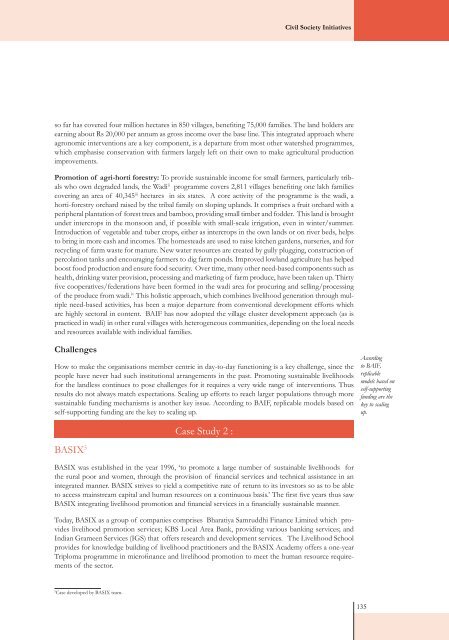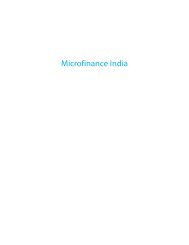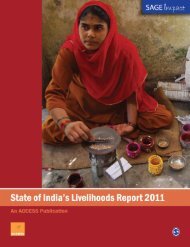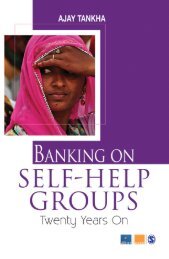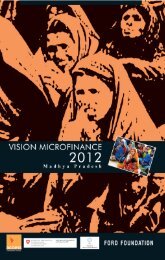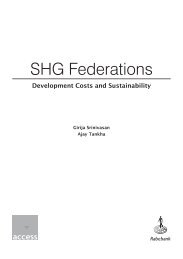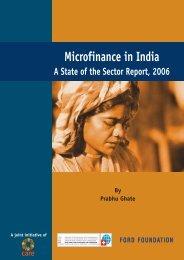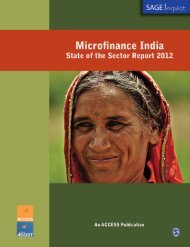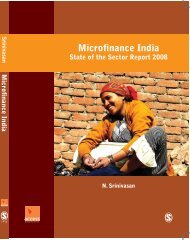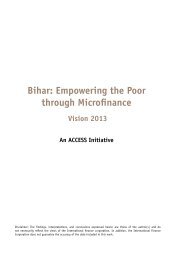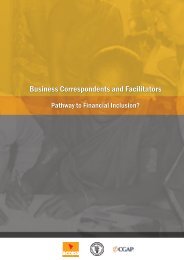Chapter VIThese issues are exemplified by the different case studies, discussed in detail below.5. Case StudiesThe case studies presented below have been examined on the basis of information collected on thelivelihood programmes 3 of several NGOs and community-based organisations (CBOs). While there areinnumerable NGO-led initiatives of value, the nine cases presented here were identified because theyhave a) achieved scale b) become established and mature programmes, and c) been innovative.Case Study 1 :Through itsvarious initiativesover 30years, BAIFhas helped 2.7million ruralfamilies, spreadover 45,000villages in 12states.The Bharatiya Agro Industries <strong>Development</strong> Research Foundation(BAIF) 4BAIF’s strategy for promoting livelihoods in rural areas, is to improve the quality of life while ensuringsustainable livelihoods and a clean environment. BAIF has three core livelihood programmes whichhave evolved over four decades. The design, approach and features of all the three programmes havebeen innovations that defied the then prevailing trend of implementation of livelihood developmentprogrammes. Through its various initiatives over 30 years, BAIF has helped 2.7 million rural families,spread over 45,000 villages in 12 states.BAIF considers the poor rural family to be the basic unit of development that requires different typesof support to come out of poverty. It emphasises blending of livelihood programmes with education,health care and development activities such as women’s empowerment, environmental protection, research,training and capacity building. According to BAIF, social mobilisation and confidence buildingare keys to sustainable impact. Therefore, it has developed a strategy of promoting grassroots-levelPeople’s Organisations (PO), right from the initiation of a project. Government recognition for BAIF’sefforts has been high since the impact of its programmes has been high. While BAIF has exited fromsome projects, it still provides some support services to the POs.Some key initiatives:Livestock development for sustainable livelihoods: BAIF pioneered the idea of upgrading livelihoodsand income levels through breed quality improvement, a revolutionary and timely initiative. The use oftop quality bulls to produce semen, and artificial insemination services delivered at the door step offarmers ensured outreach to even remote areas. The second critical aspect was to produce better progenyout of existing breeds. This was very different from the then prevailing approach of distributing highbreed exotic cattle – if sophisticated cattle are brought into a primitive system, there is a high likelihoodof failure. Tied to this was the cultivation of drought-tolerant fodder species on wastelands. Over amillion poor families, participating in the programme over 25 years, could own two-three crossbred cowsand earn an annual income of Rs 15,000-18,000.Water resources development: The approach focused on adapting the watershed model to localconditions such as reclamation of ravine lands, wastelands, very arid regions 1 etc. Modern and efficienttechnologies such as GIS and remote sensing have been adopted. Also, apart from soil and waterconservation, the emphasis on improved production and better land-use interventions has resulted inhigher moisture retention. Various activities are initiated through user groups, POs and self-help groupsSHGs for increasing cropping intensity, promotion of eco-friendly technologies, post-productionactivities, improved livestock husbandry practices and microenterprises for the landless. The programme3Details of these programmes are given in annexure to be added.4Developed by Girija Srinivasan, on the basis of discussions with Mr. G.S.Sohani, Vice President, BAIF and the documents made available by BAIF.Mr. Sohani’s suggestions on improving the draft have been invaluable.134
Civil Society Initiativesso far has covered four million hectares in 850 villages, benefiting 75,000 families. The land holders areearning about Rs 20,000 per annum as gross income over the base line. This integrated approach whereagronomic interventions are a key component, is a departure from most other watershed programmes,which emphasise conservation with farmers largely left on their own to make agricultural productionimprovements.Promotion of agri-horti forestry: To provide sustainable income for small farmers, particularly tribalswho own degraded lands, the Wadi ii programme covers 2,811 villages benefiting one lakh familiescovering an area of 40,345 iii hectares in six states. A core activity of the programme is the wadi, ahorti-forestry orchard raised by the tribal family on sloping uplands. It comprises a fruit orchard with aperipheral plantation of forest trees and bamboo, providing small timber and fodder. This land is broughtunder intercrops in the monsoon and, if possible with small-scale irrigation, even in winter/summer.Introduction of vegetable and tuber crops, either as intercrops in the own lands or on river beds, helpsto bring in more cash and incomes. The homesteads are used to raise kitchen gardens, nurseries, and forrecycling of farm waste for manure. New water resources are created by gully plugging, construction ofpercolation tanks and encouraging farmers to dig farm ponds. Improved lowland agriculture has helpedboost food production and ensure food security. Over time, many other need-based components such ashealth, drinking water provision, processing and marketing of farm produce, have been taken up. Thirtyfive cooperatives/federations have been formed in the wadi area for procuring and selling/processingof the produce from wadi. iv This holistic approach, which combines livelihood generation through multipleneed-based activities, has been a major departure from conventional development efforts whichare highly sectoral in content. BAIF has now adopted the village cluster development approach (as ispracticed in wadi) in other rural villages with heterogeneous communities, depending on the local needsand resources available with individual families.ChallengesHow to make the organisations member centric in day-to-day functioning is a key challenge, since thepeople have never had such institutional arrangements in the past. Promoting sustainable livelihoodsfor the landless continues to pose challenges for it requires a very wide range of interventions. Thusresults do not always match expectations. Scaling up efforts to reach larger populations through moresustainable funding mechanisms is another key issue. According to BAIF, replicable models based onself-supporting funding are the key to scaling up.Accordingto BAIF,replicablemodels based onself-supportingfunding are thekey to scalingup.Case Study 2 :BASIX 5BASIX was established in the year 1996, ‘to promote a large number of sustainable livelihoods forthe rural poor and women, through the provision of financial services and technical assistance in anintegrated manner. BASIX strives to yield a competitive rate of return to its investors so as to be ableto access mainstream capital and human resources on a continuous basis.’ The first five years thus sawBASIX integrating livelihood promotion and financial services in a financially sustainable manner.Today, BASIX as a group of companies comprises Bharatiya Samruddhi Finance Limited which provideslivelihood promotion services; KBS Local Area Bank, providing various banking services; andIndian Grameen <strong>Services</strong> (IGS) that offers research and development services. The Livelihood Schoolprovides for knowledge building of livelihood practitioners and the BASIX Academy offers a one-yearTriploma programme in microfinance and livelihood promotion to meet the human resource requirementsof the sector.5Case developed by BASIX team.135
- Page 3 and 4:
State of India’s Livelihoods :The
- Page 5 and 6:
ChapterPage NoForeword 6Preface 8Ab
- Page 8:
ForewordAs a part of its microfinan
- Page 11 and 12:
employment growth, these sectors we
- Page 14:
RIAARMKRRBRSVYSCSC/STsSCPSCSPSERPSE
- Page 20 and 21:
Chapter Iresponse, risks and shocks
- Page 23 and 24:
OverviewTable 1.2 Employment and Un
- Page 25 and 26:
OverviewA recent paper by Arjun Sen
- Page 27:
Overview4. How is the livelihood st
- Page 31 and 32:
Overview5.2 Manmade constraints - i
- Page 33 and 34:
Overviewthe late 1980s, these two m
- Page 35 and 36:
OverviewIn the 1970s, the Chipko mo
- Page 37 and 38:
Overviewsocial responsibility (CSR)
- Page 39 and 40:
OverviewBox 1.3 Bihar - Underdevelo
- Page 42 and 43:
4040
- Page 44 and 45:
Chapter IIAn enumeration of the dep
- Page 46 and 47:
Chapter IIBox 2.1 Macro Level Livel
- Page 48 and 49:
Chapter IIIn addition to the above,
- Page 50 and 51:
Chapter IIFig 2.1: Poverty Ratio am
- Page 52 and 53:
Chapter IIPoormigrantlabouroften su
- Page 54 and 55:
Chapter IIInterestingly, the Govern
- Page 56 and 57:
Chapter IIThe effective cost of nat
- Page 58 and 59:
Chapter IIsector and thereby casual
- Page 60 and 61:
Chapter IIReferences1. Aiyar , Swam
- Page 62 and 63:
Chapter IIIto, the vulnerability co
- Page 64 and 65:
Chapter IIIIt would be useful here
- Page 66 and 67:
Chapter IIIof new employment opport
- Page 68 and 69:
Chapter IIIinterest subvention - wo
- Page 70 and 71:
Chapter III6. The 11th Plan propose
- Page 72 and 73:
Chapter IIIBox 3.5: Rural Business
- Page 74 and 75:
Chapter III9. The achievement of ge
- Page 76 and 77:
Chapter IIIaid. The Plan also seeks
- Page 78 and 79:
Chapter IIIand health. They point o
- Page 80 and 81:
Chapter IIIReferences1. Ambasta, Pr
- Page 82 and 83:
8080
- Page 84 and 85:
Chapter IVtransport, storage, commu
- Page 86 and 87: Chapter IVing of ‘English Speakin
- Page 88 and 89: Chapter IVWhile these livelihoods h
- Page 90 and 91: Chapter IVTable 4.6 Employment with
- Page 92 and 93: Chapter IVConstruction requires no
- Page 94 and 95: Chapter IVgains in manufacturing ha
- Page 96 and 97: Chapter IV10. A Spatial Perspective
- Page 98 and 99: Chapter IVA quick glance at some of
- Page 100 and 101: Chapter IV12. Once a watershed is d
- Page 102: Chapter IVThrougha range ofschemes
- Page 105 and 106: Public Systems: Major central gover
- Page 107 and 108: Public Systems: Major central gover
- Page 109 and 110: Public Systems: Major central gover
- Page 111 and 112: Public Systems: Major central gover
- Page 113 and 114: Public Systems: Major central gover
- Page 115 and 116: Public Systems: Major central gover
- Page 117 and 118: Public Systems: Major central gover
- Page 119 and 120: Public Systems: Major central gover
- Page 121 and 122: Public Systems: Major central gover
- Page 123 and 124: Public Systems: Major central gover
- Page 125 and 126: Public Systems: Major central gover
- Page 127 and 128: Public Systems: Major central gover
- Page 129 and 130: Public Systems: Major central gover
- Page 131 and 132: Public Systems: Major central gover
- Page 133 and 134: Civil Society InitiativesChapter VI
- Page 135: Civil Society InitiativesThe human
- Page 139 and 140: Civil Society Initiativesan 8 per c
- Page 141 and 142: Civil Society InitiativesThe cooper
- Page 143 and 144: Civil Society Initiativeslimited ir
- Page 145 and 146: Civil Society Initiativesintelligen
- Page 147 and 148: Civil Society InitiativesOutboard M
- Page 149 and 150: Civil Society InitiativesCase Study
- Page 151 and 152: Civil Society InitiativesReferences
- Page 153 and 154: The Contribution of Corporate Suppl
- Page 155 and 156: The Contribution of Corporate Suppl
- Page 157 and 158: The Contribution of Corporate Suppl
- Page 159 and 160: The Contribution of Corporate Suppl
- Page 161 and 162: The Contribution of Corporate Suppl
- Page 163 and 164: The Contribution of Corporate Suppl
- Page 165 and 166: The Contribution of Corporate Suppl
- Page 167 and 168: The Contribution of Corporate Suppl
- Page 169 and 170: The Contribution of Corporate Suppl
- Page 172 and 173: Chapter VIII170
- Page 174 and 175: Chapter VIIIcountry that make the e
- Page 176 and 177: Chapter VIIIFig 8.4: All-India area
- Page 178 and 179: Chapter VIIIWhen commercial crops l
- Page 180 and 181: Chapter VIIIunit of risk settlement
- Page 182 and 183: Chapter VIIIPublic capitalformation
- Page 184 and 185: Chapter VIII8. Integrated Rural Dev
- Page 186 and 187:
Chapter VIIIAn expertpanel ‘sreco
- Page 188 and 189:
Chapter VIIIHowever as final wage s
- Page 190:
188
- Page 193 and 194:
appENDIX TableTable A.1.3: Distribu
- Page 195 and 196:
appENDIX TableEmploymentEmploymentG
- Page 197 and 198:
appENDIX TableTable 2: Employment S
- Page 199 and 200:
appENDIX TableTable 4: State Wise G
- Page 201 and 202:
appENDIX TableTable-7: Distribution
- Page 203 and 204:
appENDIX TableDams and Displacement
- Page 205 and 206:
appENDIX TableFig. A.3.2: High Pote
- Page 207 and 208:
appENDIX TableTable A.3.2Table 2: S
- Page 209 and 210:
appENDIX TableChapter IV - ANNEX TA
- Page 211 and 212:
appENDIX TableAnnex A.5.1Backward R
- Page 213 and 214:
appENDIX TableAnnex A.5.3Some UNDP
- Page 215 and 216:
appENDIX TableGross Value of Output
- Page 217 and 218:
Mona DikshitMona Dikshit has been a


